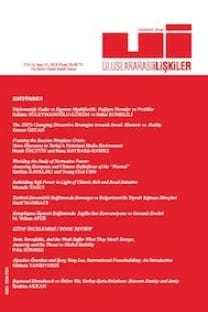Soykırım Suçunda Özel Kast Unsuru: Uluslararası Adalet Divanı ve Ad Hoc Mahkeme Uygulamaları Arasındaki İçtihat Birlikteliği ya da İhtilafı
Uluslararası toplum, tarihinde ilk defa Ad Hoc Mahkemeler olarak kurulan mahkemeler aracılığıyla Soykırım Sözleşmesi hükümlerinin yorumlanması ve uygulanmasına tanıklık etmektedir. Şüphesiz ki, uluslararası ceza hukuku alanında soykırım suçunun unsurlarının ve kapsamının belirlenmesi bakımından, adı geçen mahkemelerin uygulamaları önemli bir yere sahiptir. Ad Hoc Mahkemelerin uygulamaları yanında, Uluslararası Adalet Divanı da Bosna Hersek devleti tarafından Sırbistan aleyhine açılan Soykırım Suçunun İşlenmesinin Önlenmesi ve Sorumlularının Cezalandırılması Sözleşmesinin Uygulanmasıyla İlgili Davada (Soykırım Davası), diğer birçok sorunun yanında, soykırım suçunun unsurlarıyla da ilgilenmek zorunda kalmıştır. Ancak, uluslararası ceza hukuku alanında bireysel cezai sorumluluğun tesisiyle görevli Ad Hoc Mahkemelerin, soykırım suçunu diğer uluslararası suçlardan ayırt etmeye yarayan ve suçun en önemli unsurunu oluşturan soykırım kastı olarak ifade edilen özel kasta yönelik görüşü, Uluslararası Adalet Divanı'nın yorum ve uygulamasından farklılık arz etmektedir. Uluslararası düzeyde faaliyet gösteren Ad Hoc Mahkemeler ile Uluslararası Adalet Divanı arasındaki bu farklı yorumlama ve uygulama nasıl açıklanabilir? İçtihat birlikteliği? Ya da İhtilaf?
Anahtar Kelimeler:
Soykırım, Soykırım Kastı, Uluslararası Adalet Divanı, Bireysel Cezai Sorumluluk, Devletin Sorumluluğu.
The Specific Intent (Dolus Specialis) Requirement of the Crime of Genocide: Confluence or Conflict between the Practice of Ad Hoc Tribunals and the ICJ
The international community has been witnessing the first ever interpretation and application of the Genocide Convention through the practice of the ad hoc tribunals at the international level. The significance of the practice lies in the interpretation of the elements of the crime of genocide and in the clarification of its substantive content. In addition to the practice of the ad hoc tribunals, the International Court of Justice (the ICJ) in its judgement in the Case Concerning the Application of the Convention on the Prevention and Punishment of the Crime of Genocide (Genocide Case) had to, amongst other issues, deal with the requirements of the crime of genocide. However, the findings of both the ad hoc tribunals and the ICJ in proving the existence of the genocidal intent and the attribution of responsibility are too different from one to other. Should such a situation be perceived as a confluence or conflict in international law?
Keywords:
Genocide, Genocidal intent, International Court of Justice (ICJ), Individual Criminal Responsibility, State Responsibility.,
- ISSN: 1304-7310
- Başlangıç: 2004
- Yayıncı: Uluslararası İlişkiler Konseyi Derneği İktisadi İşletmesi
Sayıdaki Diğer Makaleler
Uluslararası Politikada Karşılıklı Bağımlılık ve Küreselleşme Üzerine Bir İnceleme
Muharrem GÜRKAYNAK, Serhan YALÇINER
Uluslararası İlişkiler Teorisinde Yerel-Görüşlülük ve Doğu'nun Özneselliği
Avrupa Birliği’nde Özel Bölgeler ve Kuzey Kıbrıs: Topluluk Hukuku’nda Sui Generis Bir İlişki
Eddie J. Girdner, USA and the New Middle East
21. Yüzyılda Çin-Afrika İlişkileri: İlgi, Uzlaşma ve Çatışma
